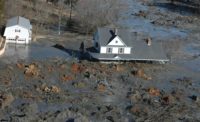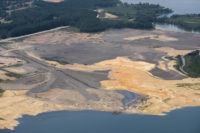Workers involved in cleanup of a massive coal-ash spill more than a decade ago from a Tennessee Valley Authority fossil-fuel power plant now must prove at trial that claimed exposure to toxic materials made them ill—after rejecting a settlement from project manager Jacobs Engineering made public on April 10.
The company, now rebranded as Jacobs, would not confirm reports valuing the offer at $10 million—to be split by a group of 52 workers employed under the firm's $40-million remediation contract for part of the contaminated site.
All parties are under a confidentiality rule set by the federal district court in Knoxville.
The ash spilled from a containment cell at the Kingston, Tenn. plant in late 2008, sending about 5 million cu yd of coal ash across 300 acres and into the Emory River. TVA spent more than $1 billion cleaning up the site after the accident, which also resulted in new requirements for ash containment at the site and at other coal-burning U.S. power plants. The Kingston cleanup was completed in 2015.
“It is disappointing that after many months of negotiations, the parties failed to reach a final settlement,” Theodore Boutrous, a New York City-based attorney representing Jacobs, told ENR. Attorneys for the plaintiffs did not respond to ENR.
A federal jury in 2018 found Jacobs guilty of failing to protect the health of workers cleaning up the massive spill, which enabled them to seek damages from the company. Workers reported a variety of illnesses, including lung cancer, leukemia and others, that they claim is linked to contaminants in the ash.
Press reports in 2018 said that more than 30 workers who cleaned the site under Jacobs' contract have died and more than 250 others were sick or dying.
TVA was not a party to the lawsuit, and did not comment, except to say that the U.S. Environmental Protection Agency has deemed coal ash not to be regulated as a hazardous waste.
Plaintiffs claimed Jacobs willfully exposed them to fly ash, which included arsenic, silica quartz, aluminum oxide, iron oxide and calcium oxide, and other toxic substances, and “engaged in intentional improper air monitoring of fly ash in violation of federal and state laws,” said a 2013 complaint.
Workers claimed they were intentionally deprived of adequate safety training and protective equipment
But it was undisputed at trial that there were numerous safety measures implemented at the site as required under the site safety plan that was approved by EPA and TVA, Jacobs said recently.
According to the firm, the jury in the first phase of the trial ruled that the alleged actions by Jacobs were capable of causing certain types of injuries and illnesses, but not that they actually were the cause..
During the next trial, for which a date is not yet set, plaintiffs must show that their exposures were a significant factor in causing their claimed illnesses. They are entitled to ask for payment covering medical expenses, lost wages, lost earning potential, pain and suffering and punitive damages.
Plaintiffs have suggested in court documents that upcoming trials take place in groups by type of disease, with the first to be "as soon as possible but no later than a year from now."
But Jacobs' attorney Boutrous says "as the cases move on to the next phase, we are confident that the evidence will show that Jacobs did not have any connection" with plaintiffs' alleged illnesses. "A significant number of the workers involved in this litigation had the medical conditions that they alleged were caused by Jacobs long before they started working at Kingston," he claims.






Post a comment to this article
Report Abusive Comment